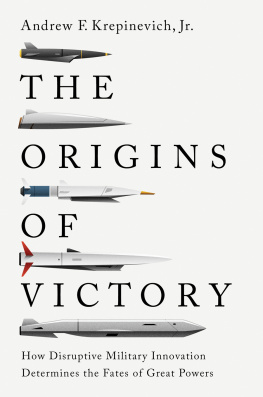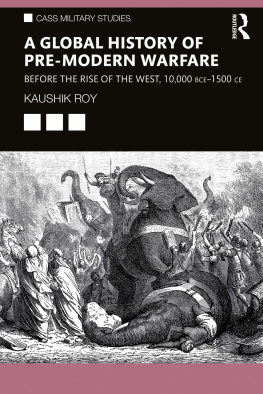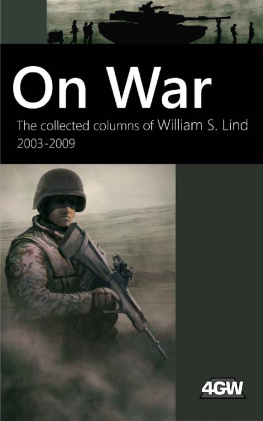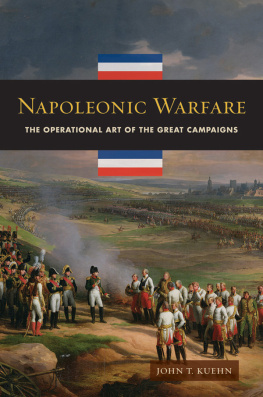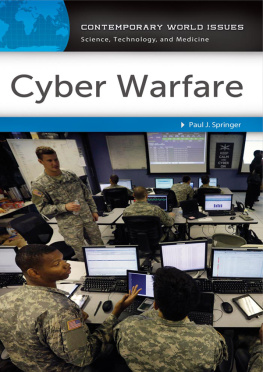Copyright Information
4th Generation Warfare Handbook
William S. Lind and Gregory A. Thiele
Published by Castalia House
Kouvola, Finland
www.castaliahouse.com
This book or parts thereof may not be reproduced in any form, stored in a retrieval system, or transmitted in any form by any meanselectronic, mechanical, photocopy, recording, or otherwisewithout prior written permission of the publisher, except as provided by Finnish copyright law.
Copyright 2015 by William S. Lind and Gregory A. Thiele
All rights reserved
Editor: Vox Day
Cover Design: JartStar
Cover Image: rjan Ruttenborg Svendsen
Version: 001
4th Generation Warfare Handbook
by William S. Lind and Gregory A. Thiele
Foreword
This book is a follow-on to William S. Linds Maneuver Warfare Handbook, first published in 1985 and still in print.
Its genesis lies in a series of seminars initially led by Mr. Lind and later co-chaired by several Marine officers, most frequently then-Major Greg Thiele. The first seminar, which met at Mr. Linds home in Alexandria, Virginia, created the first Fourth Generation war field manual, FMFM-1A, Fourth Generation War. Subsequent papers dealing with specific aspects of Fourth Generation war were written by seminars at the Marine Corps Expeditionary Warfare School in Quantico, Virginia. These studies were published as manuals of the Imperial and Royal (K.u.K.) Austro-Hungarian Marine Corps and are available at www.traditionalright.com.
The seminars were composed primarily of Marine Corps officers, mostly captains, plus officers from each of the other U. S. Armed Services and foreign officers from services including the Royal Swedish Marines, Royal Marines, Royal Netherlands Marines and the Argentine Army and Marine Corps. We gratefully acknowledge the work of all these officers and hope this handbook will serve to spread their thoughts on Fourth Generation war to a wider audience.
This book presumes a familiarity with the overall framework of the Four Generations of Modern War, a framework created by Mr. Lind in the 1980s. Those who wish to study the overall framework, including the first three generations, before reading this handbook can find a brief description included in the appendices. A more detailed description is available in both audiobook and ebook form, The Four Generations of Modern War, from Castalia House press. It can be found on Amazon or at the Castalia House store.
William S. Lind
LtCol Gregory A. Thiele, USMC
Introduction
Just as Alexanders exploits only reached the Middle Ages as a dim, fantastic tale, so in the future people will probably look back upon the twentieth century as a period of mighty empires, vast armies and incredible fighting machines that have crumbled into dust
Martin van Creveld, The Transformation of War
War is Changing
War always changes. Our enemies learn and adapt, and we must do the same or lose. But today, war is changing faster and on a larger scale than at any time in the last 350 years. Not only are we facing rapid change in how war is fought, we are facing radical changes in who fights and what they are fighting for. All over the world, state militaries find themselves fighting non-state opponents.
This kind of war, which we call Fourth Generation war, or 4GW, is a very difficult challenge. Almost always, state militaries have vast superiority over their non-state opponents in what we call combat power: technology, weapons, techniques, training, etc. Despite this superiority, more often than not, state militaries end up losing.
Americas greatest military theorist, U. S. Air Force Colonel John Boyd, used to say, When I was a young officer, I was taught that if you have air superiority, land superiority and sea superiority, you win. Well, in Vietnam we had air superiority, land superiority and sea superiority, but we lost. So I realized there is something more to it.
This handbook is about that something more. In order to fight Fourth Generation war and win, the armed forces of the state need to understand what that something more is. That, in turn, requires an intellectual framework a construct that helps us make sense of facts and events, both current and historical.
The intellectual framework put forward in this handbook is called The Four Generations of Modern War. established a monopoly on war. After 1648, first in Europe and then around the world, war was transformed into an activity that was waged by states against other states, using state armies, state navies, and eventually, state air forces. To modern observers, the assumption that war is something waged by states is so automatic that we have difficulty thinking of war in any other way. We sometimes misleadingly call war against non-state opponents Operations Other Than War or Stability and Support Operations, or more recently, Hybrid War.
In fact, before the Peace of Westphalia, many different entities waged wars. Families waged wars, as did clans and tribes. Ethnic groups and races waged war. Religions and cultures waged war. So did business enterprises, legal as well as illegal. These wars were often many-sided, not two-sided, and alliances constantly shifted.
Not only did many different entities wage war, they used many different means. Few of these non-state entities possessed anything we would recognize as a formal army, navy or Marine Corps, although Marines were often present in the form of fighting men on galleys. When war came, whoever was fighting would hire mercenaries both on land and at sea. In other cases, such as tribal war, the army was any male old enough to carry a weapon, but not too old to fight. In addition to campaigns and battles, war was waged by bribery, assassination, treachery, betrayal, and even dynastic marriage. The lines between civilian and military, and between crime and war, were either hazy or nonexistent. Many societies knew little internal order or peace; when not hired out for wars, bands of men with weapons simply took whatever they wanted from anyone too weak to resist them.
Here, the past is prologue. Much of what state-armed forces now face in Fourth Generation wars is simply war as it was fought before the rise of the state and the Peace of Westphalia. Once again, clans, tribes, ethnic groups, cultures, religions and gangs are fighting wars, in more and more parts of the world. They fight using many different means, not only conventional engagements and battles. Once again, conflicts have become many-sided rather than two-sided. Officers and enlisted men who find themselves caught up in such conflicts quickly discover they are difficult to understand and even harder to win.
The Root of the Problem
At the heart of this phenomenon, Fourth Generation war, lies not a military evolution but a political, social, and moral revolution: a crisis of legitimacy of the state. All over the world, citizens of states are transferring their primary allegiance away from the state to other entities: to tribes, ethnic groups, religions, gangs, ideologies, and causes. Many people who will no longer fight for their state are willing to fight for their new primary loyalty. In Americas two wars with Iraq, the Iraqi state-armed forces showed little fight. But Iraqi insurgents whose loyalties were to various non-state elements waged a hard-fought and effective guerrilla war.
The fact that the root of Fourth Generation war is a political, social, and moral phenomenon, the decline of the state, means there can be no purely military solution to Fourth Generation threats. Military force is incapable, by itself, of restoring legitimacy to a state.


